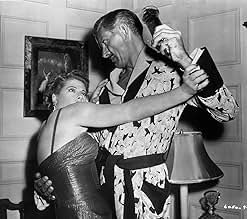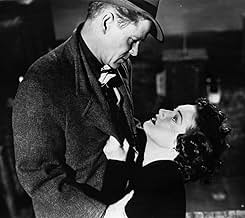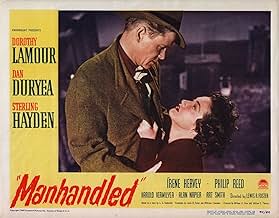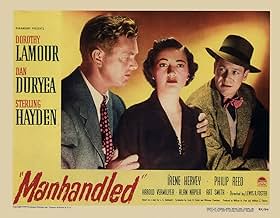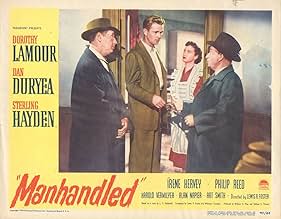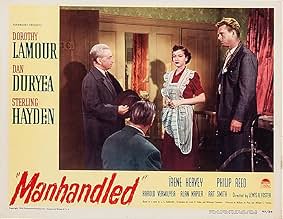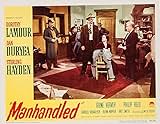Añade un argumento en tu idiomaThe secretary to a psychiatrist finds herself caught up in the murder of a patient's wife and realizes that her life is also in danger.The secretary to a psychiatrist finds herself caught up in the murder of a patient's wife and realizes that her life is also in danger.The secretary to a psychiatrist finds herself caught up in the murder of a patient's wife and realizes that her life is also in danger.
- Dirección
- Guión
- Reparto principal
Benny Baker
- Boyd, Man in Apartment House Lobby with Girl
- (sin acreditar)
Stanley Blystone
- Cop
- (sin acreditar)
Paul E. Burns
- Pawn Shop Owner
- (sin acreditar)
James Edwards
- Henry, Bennet's Butler
- (sin acreditar)
Morgan Farley
- Doc, Police Lab Man
- (sin acreditar)
John George
- Newspaper Vendor
- (sin acreditar)
George Humbert
- Italian Restaurant Owner
- (sin acreditar)
Ray Hyke
- Detective Phil Wilson
- (sin acreditar)
Donald Kerr
- Reporter
- (sin acreditar)
Reseñas destacadas
"Manhandled" is a decent 1949 film with a terrific cast that could have been really excellent. Unfortunately, it suffers from a lack of focus from director Lewis Foster.
Dorothy Lamour plays the secretary to a psychiatrist (Harold Vermilyea) who is treating an author (Alan Napier). The man has a recurring dream that he kills his wife (Irene Hervey) with a large perfume bottle. The doctor thinks he needs money and might be after his wife's jewels, worth somewhere in the range of $100,000.
Lamour, whose character's name is Merl Kramer, tells a detective in her apartment building (Dan Duryea) about the strange case. Any of us who have ever seen Dan Duryea in a film know that this is a mistake on her part.
As could have been predicted, the wife of the author winds up dead, the jewels stolen, and one of the pieces winds up in Merl's couch. She pawns it and finds herself in deep trouble.
As you might be able to tell from the above description, the director isn't the only problem here. The script doesn't hold up to the most casual of scrutiny.
Granted Merl doesn't tell the Duryea character the name of her boss' client, but she certainly would know what goes on in the office is confidential. The big perfume bottle as the murder weapon is pretty lame.
The worst aspect for me is the diagnosis of the psychiatrist. A man and his wife are living under the same roof, but they're estranged. She's seeing somebody else, in fact, and the psychiatrist comes to the conclusion that the author wants his wife's jewels. That's some stretch.
It's always sad to see what happened to some of the glamorous female film stars - Lamour here is all of 34 and relegated to smaller films. Her character has a mysterious past which we never really learn about, another script hole.
Sterling Hayden plays an insurance investigator and does a good job. Art Smith is the police detective and very funny.
Kind of a mish-mash, and a convoluted plot that could have emerged as a neat twist in other hands, but some good scenes nonetheless.
Dorothy Lamour plays the secretary to a psychiatrist (Harold Vermilyea) who is treating an author (Alan Napier). The man has a recurring dream that he kills his wife (Irene Hervey) with a large perfume bottle. The doctor thinks he needs money and might be after his wife's jewels, worth somewhere in the range of $100,000.
Lamour, whose character's name is Merl Kramer, tells a detective in her apartment building (Dan Duryea) about the strange case. Any of us who have ever seen Dan Duryea in a film know that this is a mistake on her part.
As could have been predicted, the wife of the author winds up dead, the jewels stolen, and one of the pieces winds up in Merl's couch. She pawns it and finds herself in deep trouble.
As you might be able to tell from the above description, the director isn't the only problem here. The script doesn't hold up to the most casual of scrutiny.
Granted Merl doesn't tell the Duryea character the name of her boss' client, but she certainly would know what goes on in the office is confidential. The big perfume bottle as the murder weapon is pretty lame.
The worst aspect for me is the diagnosis of the psychiatrist. A man and his wife are living under the same roof, but they're estranged. She's seeing somebody else, in fact, and the psychiatrist comes to the conclusion that the author wants his wife's jewels. That's some stretch.
It's always sad to see what happened to some of the glamorous female film stars - Lamour here is all of 34 and relegated to smaller films. Her character has a mysterious past which we never really learn about, another script hole.
Sterling Hayden plays an insurance investigator and does a good job. Art Smith is the police detective and very funny.
Kind of a mish-mash, and a convoluted plot that could have emerged as a neat twist in other hands, but some good scenes nonetheless.
The shot of an ecstatic Duryea running down a terrified Vermilyea in the narrow, darkened alley way is a great slice of noir. Too bad the tension comes so late because, despite the promising title and noir icon Duryea, the narrative holds together about as well as an O J Simpson alibi. Looks like three different scriptwriters came up with three different results, so you may need a chart to track all the threads meandering through the plot. What the screenplay lacks is focus. There really is no central character holding developments together. Hayden's the headliner, yet his role as insurance investigator remains oddly inessential. Instead, lowly Art Smith gets the law-and-order screen time and in fact most of the movie time. Now, I like actor Smith as much as the next guy, especially in sly roles (Ride the Pink Horse {1947}); still, his comic relief here is not only misplaced, but too often sounds like it's being done by the numbers. (And whoever is it that thought a cop car without brakes is funny!)
On a more positive note, Alan Napier gets a delicious turn as the snooty novelist husband, but unfortunately soon drops out of sight, and I'm really sorry Irene Hervey's sexy wife bites the dust early on. She's a lively and interesting presence, making her spats with Napier a movie high point. And that's another source of trouble. Everyone disappears from the narrative for significant periods, such that a nudge is sometimes needed to remember who they are, even the largely wasted Lamour. All this might be okay if the plot or direction generated some suspense, but they don't, at least in my little book. In fact, if it weren't for the great Duryea doing another of his patented oily operator roles, the movie would be much more forgettable than it already is. From the title, I certainly expected better.
On a more positive note, Alan Napier gets a delicious turn as the snooty novelist husband, but unfortunately soon drops out of sight, and I'm really sorry Irene Hervey's sexy wife bites the dust early on. She's a lively and interesting presence, making her spats with Napier a movie high point. And that's another source of trouble. Everyone disappears from the narrative for significant periods, such that a nudge is sometimes needed to remember who they are, even the largely wasted Lamour. All this might be okay if the plot or direction generated some suspense, but they don't, at least in my little book. In fact, if it weren't for the great Duryea doing another of his patented oily operator roles, the movie would be much more forgettable than it already is. From the title, I certainly expected better.
A stuffy novelist (Alan Napier) suffers recurring nightmares that he bludgeons his rich jewel-horse of a wife (Irene Hervey) to death with a `quart' bottle of cologne. That's bad enough, but what's worse is that he confides his dreams to a shrink (Harold Vermilyea). Didn't he know that it was the 1940s, when psychiatry was little more than a hotbed of scheming quacks? So when his wife inevitably winds up dead (and her diamonds stolen), he becomes the prime suspect, even though she had been out clubbing with another man (Philip Reed).
That's the uptown side of Manhandled; there's a seedier angle as well. The psychiatrist's transcriptionist (Dorothy Lamour) not only sits in on his sessions but later climbs the stairs to her Manhattan walk-up and spills the beans to her neighbor Dan Duryea, an ex-cop now doing repo jobs and divorce frame-ups. So much for codes of confidentiality. But when a signet ring she found while vacuuming her sofa and then pawned brings the police to her door, along with insurance investigator Sterling Hayden, it starts to look bad. It doesn't help that she just blew in from Los Angeles with forged letters of reference....
Manhandled unfurls an elaborate, and none too plausible, mystery plot competently enough, even with a few skillful touches (in its final quarter, it takes a sharp turn toward noir, and better late than never). Director Lewis Foster, however, failed to optimize the solid cast he was handed: Hayden's part never comes into clear focus and Lamour plays little more than a bland patsy. Duryea dominates, with his familiar two-faced persona as the cheery suck-up who likes to slap women around; Art Smith, as the comic relief of the police detective, becomes, after Duryea, the movie's most memorable character. It's not a bad movie, despite a couple of clunky flashbacks. But in better hands, it could have become one of the better noirs. As it stands, it merits that dark and honorable designation only by the skin of its teeth.
That's the uptown side of Manhandled; there's a seedier angle as well. The psychiatrist's transcriptionist (Dorothy Lamour) not only sits in on his sessions but later climbs the stairs to her Manhattan walk-up and spills the beans to her neighbor Dan Duryea, an ex-cop now doing repo jobs and divorce frame-ups. So much for codes of confidentiality. But when a signet ring she found while vacuuming her sofa and then pawned brings the police to her door, along with insurance investigator Sterling Hayden, it starts to look bad. It doesn't help that she just blew in from Los Angeles with forged letters of reference....
Manhandled unfurls an elaborate, and none too plausible, mystery plot competently enough, even with a few skillful touches (in its final quarter, it takes a sharp turn toward noir, and better late than never). Director Lewis Foster, however, failed to optimize the solid cast he was handed: Hayden's part never comes into clear focus and Lamour plays little more than a bland patsy. Duryea dominates, with his familiar two-faced persona as the cheery suck-up who likes to slap women around; Art Smith, as the comic relief of the police detective, becomes, after Duryea, the movie's most memorable character. It's not a bad movie, despite a couple of clunky flashbacks. But in better hands, it could have become one of the better noirs. As it stands, it merits that dark and honorable designation only by the skin of its teeth.
Really loved the idea for the story, and 'Manhandled' is exactly my kind of film as a fan of crime, mystery and thriller in all media. Sterling Hayden was always watchable when he was in good roles. Likewise with Dorothy Lamour. It was interesting too seeing a pre-Alfred (from 'Batman') Alan Napier. Other than the story and my love for the genres, my main reason for seeing 'Manhandled' was for Dan Duryea in a role he could play at the back of his hand with no problem.
'Manhandled', after watching it, is worth a look. If you love Duryea and in the type of role he plays here, you won't be disappointed. If one wants a story that consistently grabs the attention and is consistently easy to follow, dependent on personal tastes 'Manhandled' may underwhelm, like it did with me. Is it a bad film? Of course not. There is plenty going for it and it is above average. It just had a lot of potential to be great.
Beginning with the good things, 'Manhandled' is shot and designed with a gritty and classy atmosphere that never lets up. It's a very good looking film without looking too clean or unneccessarily lavish. The music is suitably ominous when used. The script is generally tight and intriguing.
There is some nice tension in the storytelling, especially towards the end when things do become exciting, and did like that the atmosphere was uncompromising and had a seediness about it at times. Napier is a delight in his role and Art Smith is amusing in his. Hayden does quite well and in command with what he is given to work with and his character is not very well fleshed out. Stealing the film is a genuinely sinister Duryea, his face alone unsettles you.
Lamour is a lot less good however in my view. Her role is practically a nothing cipher and Lamour is very bland in it. The direction is competent enough if undistinguished and could have generated a lot more tension and crispness, some of the middle felt on the pedestrian side.
Although the story has moments, it tended to be too convoluted as a result of too much going on and too many characters. The flashbacks do intrigue in parts but generally slow the pace down and further confuses the story rather than making it clearer.
Concluding, above average but not much more. 6/10
'Manhandled', after watching it, is worth a look. If you love Duryea and in the type of role he plays here, you won't be disappointed. If one wants a story that consistently grabs the attention and is consistently easy to follow, dependent on personal tastes 'Manhandled' may underwhelm, like it did with me. Is it a bad film? Of course not. There is plenty going for it and it is above average. It just had a lot of potential to be great.
Beginning with the good things, 'Manhandled' is shot and designed with a gritty and classy atmosphere that never lets up. It's a very good looking film without looking too clean or unneccessarily lavish. The music is suitably ominous when used. The script is generally tight and intriguing.
There is some nice tension in the storytelling, especially towards the end when things do become exciting, and did like that the atmosphere was uncompromising and had a seediness about it at times. Napier is a delight in his role and Art Smith is amusing in his. Hayden does quite well and in command with what he is given to work with and his character is not very well fleshed out. Stealing the film is a genuinely sinister Duryea, his face alone unsettles you.
Lamour is a lot less good however in my view. Her role is practically a nothing cipher and Lamour is very bland in it. The direction is competent enough if undistinguished and could have generated a lot more tension and crispness, some of the middle felt on the pedestrian side.
Although the story has moments, it tended to be too convoluted as a result of too much going on and too many characters. The flashbacks do intrigue in parts but generally slow the pace down and further confuses the story rather than making it clearer.
Concluding, above average but not much more. 6/10
Considering the cast and story, it's unfortunate that director Lewis Foster could not end up with a real film noir. Dan Duryea is up to par playing a sleazy double-crosser but Sterling Hayden is wasted as an insurance investigator who spends most of his time standing around or tagging along with the cops. The always reliable Alan Napier is a highlight of the film playing the stoic, self-righteous jilted husband.
The attempts at humor along the way relegate the film to the realm of a 1930's murder mystery, not a serious noir. There certainly was a lost opportunity for something better. Nevertheless, any film with Duryea and Hayden is worth a watch.
The attempts at humor along the way relegate the film to the realm of a 1930's murder mystery, not a serious noir. There certainly was a lost opportunity for something better. Nevertheless, any film with Duryea and Hayden is worth a watch.
¿Sabías que...?
- CuriosidadesStar Dorothy Lamour, in her autobiography, described working with George Reeves in the role of "an extremely sinister cad," despite the fact that he is nowhere to be seen in the film and no studio or trade references confirm his participation.
- PifiasThe police would never have allowed a private detective to search a suspect's room unaccompanied because of the risk of evidence being planted, which is exactly what happened. Similarly they would not have tolerated interference by an insurance investigator.
- Citas
Detective Lt. Bill Dawson: I've never known a congenital wise-guy yet that didn't outsmart himself.
- ConexionesReferenced in Remington Steele: Cast in Steele (1984)
Selecciones populares
Inicia sesión para calificar y añadir a tu lista para recibir recomendaciones personalizadas
- How long is Manhandled?Con tecnología de Alexa
Detalles
- Fecha de lanzamiento
- País de origen
- Idioma
- Títulos en diferentes países
- A Man Who Stole a Dream
- Localizaciones del rodaje
- Empresa productora
- Ver más compañías en los créditos en IMDbPro
- Duración1 hora 37 minutos
- Color
- Relación de aspecto
- 1.37 : 1
Contribuir a esta página
Sugerir un cambio o añadir el contenido que falta

